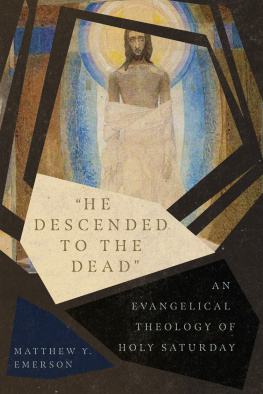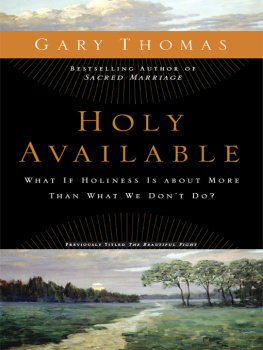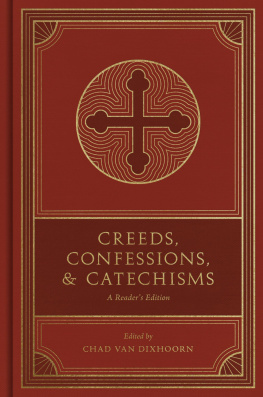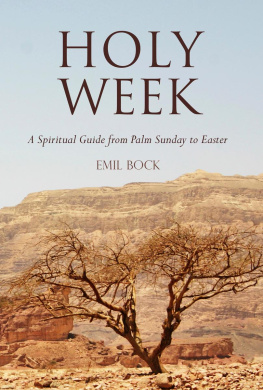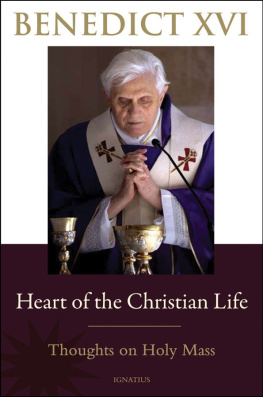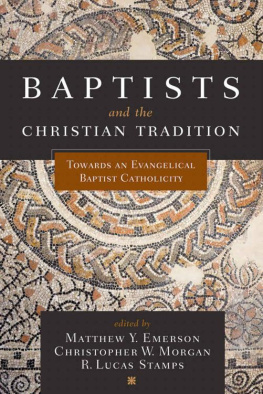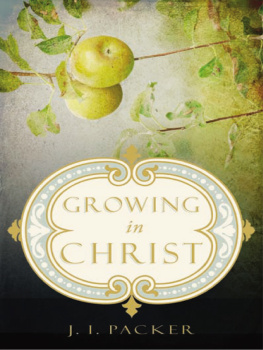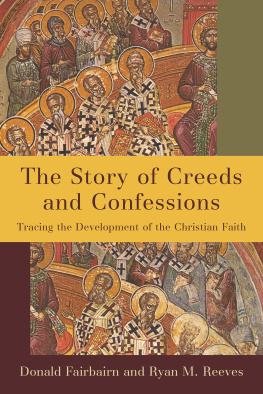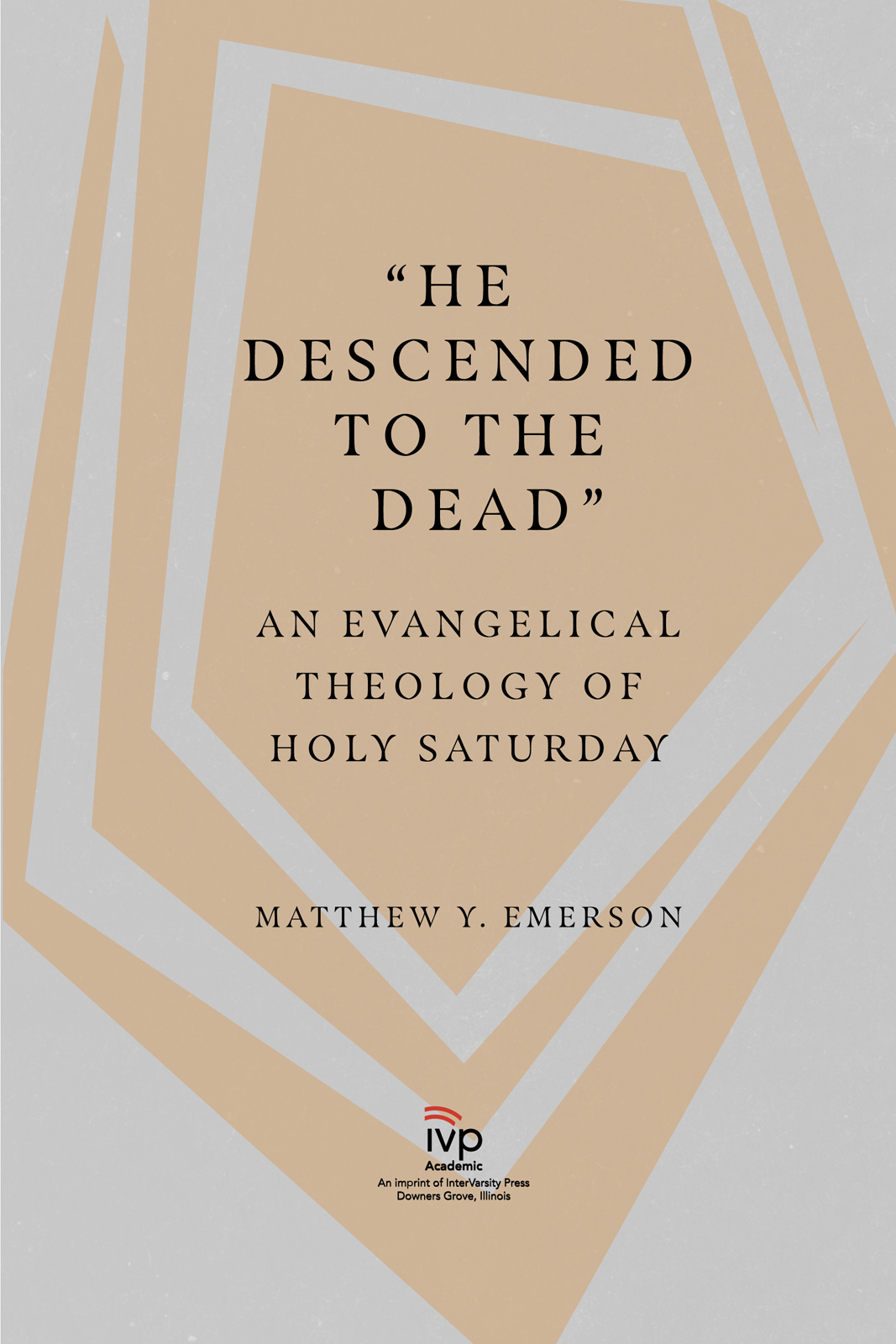Sommaire
Pagination de l'dition papier
Guide
InterVarsity Press
P.O. Box 1400, Downers Grove, IL 60515-1426
ivpress.com
2019 by Matthew Y. Emerson
All rights reserved. No part of this book may be reproduced in any form without written permission from InterVarsity Press.
InterVarsity Press is the book-publishing division of InterVarsity Christian Fellowship/USA, a movement of students and faculty active on campus at hundreds of universities, colleges, and schools of nursing in the United States of America, and a member movement of the International Fellowship of Evangelical Students. For information about local and regional activities, visit intervarsity.org.
Scripture quotations, unless otherwise noted, are from The Holy Bible, English Standard Version, copyright 2001 by Crossway Bibles, a division of Good News Publishers. Used by permission. All rights reserved.
Icon of the Resurrection / Surgun100, Wikimedia Commons
Icon showing baptism of Christ / Wikimedia Commons
Cover design and image composite: David Fassett
Interior design: Jeanna Wiggins
Images: recycled cardstock texture: Zakharova_Natalia / iStock / Getty Images Plus
gold foil texture: Katsumi Murouchi / Moment Collection / Getty Images
Resurrection by Mikhail Aleksandrovich Vrubel at Museum of Russian Art, Kiev, Ukraine /
Bridgeman Images
ISBN 978-0-8308-7053-0 (digital)
ISBN 978-0-8308-5258-1 (print)
This digital document has been produced by Nord Compo.
For B, Grandma, Aunt Jane,
and all those in the communion of the saints who are,
though absent from the body,
now present with the Lord
(2 Cor 5:8)
PREFACE
No worst, there is none. Pitched past pitch of grief,
More pangs will, schooled at forepangs, wilder wring.
Comforter, where, where is your comforting?
Mary, mother of us, where is your relief?
My cries heave, herds-long; huddle in a main, a chief
Woe, world-sorrow; on an age-old anvil wince and sing
Then lull, then leave off. Fury had shrieked No ling-
ering! Let me be fell: force I must be brief.
O the mind, mind has mountains; cliffs of fall
Frightful, sheer, no-man-fathomed. Hold them cheap
May who neer hung there. Nor does long our small
Durance deal with that steep or deep. Here! creep,
Wretch, under a comfort serves in a whirlwind: all
Life death does end and each day dies with sleep.
GERARD MANLEY HOPKINS, NO WORST,
THERE IS NONE, PITCHED PAST PITCH OF GRIEF
This haunting poem reminds us that death is inevitable for human beings. And while we may want to avoid acknowledging this pervasive reality, we all know it is true. We are bombarded daily, hourly, with grim news from both home and abroad. The list of celebrities who died in the past year, usually posthumously paraded via images at the Oscars, seems to grow longer and closer to home each year. Cancer, unforeseen accidents, murder, and plain old age take those acquaintances, distant relatives, coworkers, friends, spouses, parents, and children so often that it is easy to become numb to it. And yet despite all our attempts at avoidance and even with the growing numbness, one day we, too, will face the fact that our lives are about to end. In short, Death comes for us all. This pervasive reality, one to which the Bible bears witness and even personifies as one of Gods most ardent enemies, is apparent in the world around us. It is apparent in our own experience. When I first wrote this preface, my Aunt Jane was dying of ovarian cancer. After battling it for eight years (much longer than expected), she was facing her end in this present life. She could not eat or drink, and soon after passed away into eternity. And as I wrote this book, I thought of an acquaintance who lost twins in childbirth. This then reminded me of another friend who has lost a child at birth and his father to suicide, and who will one day lose his wife to a debilitating and chronic tumor on her spine. Death is all around us.
What, as Christians, can we say to those who face death, either their own or that of their loved ones? We certainly can give them the hope of Christs resurrection, if they or their loved one has trusted Christ in repentance and faith. We can also assure them that they do not grieve without hope because they, if they and their loved ones are Christ-followers, will one day see that loved one again. But here is what faces us in the meantime: the twin realizations thatunless we too pass on soonwe will not see them face to face for a long time and that this is because our loved ones no longer live bodily on this earth. Yes, they and we will be raised with Christ one day; yes, we have hope in the resurrection; and yes, they are with Christ. But on this last note, perhaps there is some further hope we can offer. Perhaps there is something more immediate than Christs second coming and believers resurrection to eternal life that we can preach to those grieving but not without hope. The hope that is more immediate, and one that is descriptive of our departed loved ones eternal state right now, not just some distant day, is that Christ, too, has experienced death. He did not just experience dying only to rise again moments later, but he actually remained dead in the grave. He did not simply have his breath expire and then immediately rise to glory, but his body was buried and his soul departed to the place of the dead. And because he is God in the flesh, he defeated the place of the dead and the grave by descending into them and then rising again on the third day. In the Christian tradition, this hope is known as the doctrine of Christs descensushis descent to the dead.
Descents are everywhere. From Hercules and Orpheus venturing into Hades, to Harry Potter following the pipes down into the Chamber of Secrets, to the Sheriff and Joyce Byers frantically searching for Will in the Upside Down (in the Netflix series Stranger Things), we want our heroes to descend into the underworld, defeat the enemy, and rescue their loved ones. We want Maui to enter the Realm of Monsters and defeat Tamatoa in the Disney film Moana. We love seeing Doctor Strange enter the Dark Dimension, experience death ad infinitum, and thereby trick and defeat Mordo at the end of the film named after him. Our hearts swell while reading The Silver Chair as Jill and Eustace rescue Prince Rilian from Underland, and in The Lord of the Rings as Gandalf descends into the depths of Moria, gives up his own life to defeat the Balrog, and then rises again to save Middle-Earth. There is something fascinating abouta shared yearning fora hero who can enter the underworld, defeat our enemies, and bring the dead back to life.
This descent motif, so popular in ancient and modern mythology, is also found in the historic events of the Bible, climaxing in Christs descent to the dead between his death and resurrection. It might seem like an odd thing to meditate on the fact that Jesus remained dead for three days, and yet that is what I have done for the past two years, nearly daily, many times hourly and by the minute. It may seem even stranger to hear that, over the course of that time, this doctrine has become a source of comfort, amazement, and worship of our Triune God for me. That God himself would descend in the incarnate Son to take on human flesh and all that entails, including not only dying but remaining dead, in order to redeem us from the curse of sin, is at the heart of the good news. God the Son first descended when he took on flesh, and in doing so he experienced all that humanity experiences, including death and its temporal state. What good news is this, that God vicariously experiences not only life but also death with us through the incarnate Son? What gospel do Christians proclaim, except that Jesus has defeated all rulers, authorities, principalities, and powers, including death itself, and that he does so through dying for sin, remaining dead, and rising from the dead? And what hope do Christians have for those who, unlike those who read these words, no longer live? We who follow Christ have the hope that Jesus already experienced death, the state of being dead, with and for those who trust in his atoning death and victorious resurrection. This doctrine moves me to be comforted in the face of death. This doctrine comforts me as I grieve with those who grieve and as I remember those to whom Ive dedicated this book. And it moves me to worship and praise as I comprehend more deeply each day what it means for God the Son to take on human flesh for us and for our salvation.

